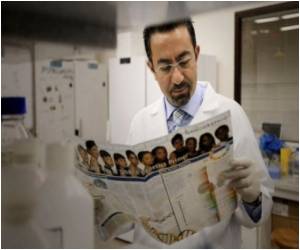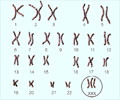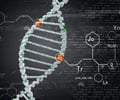Chromosomes acquire a characteristic X-shape with the two DNA molecules (sister chromatids) during cell division. The link at a central connection region contains highly compacted DNA.

The results of this study, published now in the open access journal PLOS Biology*, raise the possibility that chromosome rearrangements involving these regions, often seen in many cancers, can induce additional errors in cell division and thereby compromise genetic stability.
The key to understand this problem lies on the "glue" that keeps the two sister chromatids together. This gluing occurs by the action of proteins called cohesins that are usually enriched at the compact "connection region". In this study, researchers monitored cell division in different strains of the fruit fly Drosophila melanogaster that carry chromosomes with misplaced sections of highly compacted DNA. Their results indicated that the inappropriate location of these chromosomal regions is sufficient to load the cohesion "glue", leading to the formation of additional connections between sister-chromatids. As cell division proceeds and the sister chromatids are pulled to opposite poles of the cell, the presence of these extra cohesion sites leads to abnormal chromosome stretching as it is harder to "unglue" the chromatids.
Raquel Oliveira, first author of this study, explains: "Many cancer cells have these type of chromosomal abnormalities and we now show that this can bring additional problems every time a cell divides". William Sullivan (UCSC), collaborator of this work, adds: "Like a car with its engine out of tune, over many cell divisions this is likely to result in severe disruptions in chromosome organization".
"When we started this work, I was initially interested in understanding how the "glue" was loaded onto these abnormal chromosomes. My colleague Shaila Kotadia (UCSC), co-first author of this work, was investigating chromosome segregation defects in these fruit fly strains. We soon realized that the two questions were potentially linked and joint efforts to dissect how and why cell division was affected in these cells", says Raquel Oliveira. These experiments started during Raquel’s post-doctoral work at the University of Oxford and were concluded after her move to the IGC.
Source-Eurekalert












